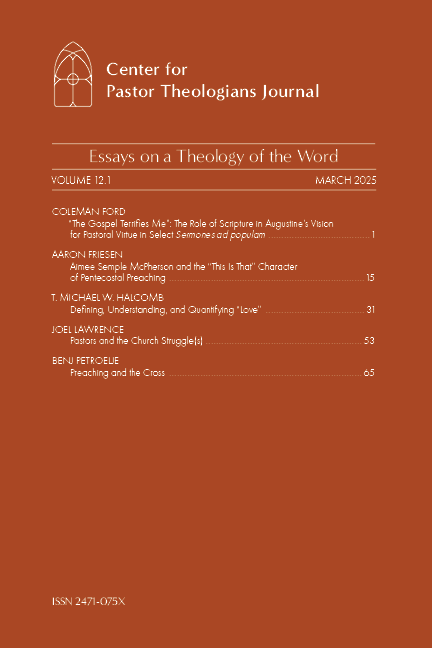Volume 12.1
Essays on a Theology of the Word
Spring 2025
The Center for Pastor Theologians, through the generous support of the Lilly Foundation, is engaged in a multi-year process of articulating a theology of preaching. Our conviction is that, though evangelicalism centers the sermon, it does not have a robust theology of preaching. Because of this, non-theologically driven methods often shape the church’s preaching, resulting in preaching that is formed by techniques borrowed from the culture.
Our response to this is to cast a vision for a more robust theological account of preaching for evangelicalism that is rooted in the doctrines of the Word, the Spirit, and the Church. The essays in this volume arise from the reflections of our community on a theology of the Word and preaching. Through these reflections, three themes have taken on central importance in our thinking.
The Word of God Is Always God’s Word
In our study, the importance of understanding the Word of God in relation to God’s freedom was identified. God is the initiator of his Word; God ever remains the Lord of his Word and is therefore the proclaimer of his Word. God sends his Word, and he never gives that Word over to humans for us to possess and make our own.
The notion of God’s Word remaining God’s Word alerts us to the subtle, and not so subtle, ways that humans take God’s Word and seek to control it for our own purposes. This can happen when an Elmer Gantry-like charlatan blatantly abuses God’s Word for personal profit or when a theological vision places God’s Word under human reason and reads it through cultural commitments. It can also happen through a mistaken understanding of how God sends God’s Word. One of the dangers for evangelical preaching is that it can fall prey to trusting in methods and interpretive expertise, subtly making the interpreter the master of the text. There is a danger that the evangelical emphasis on the objective text, which we strongly affirm, can become the means of making interpreters the initiating agent in an engagement with God’s Word. But God’s Word is always God’s; we must be very attentive to the temptation to use God’s Word for our own programs and projects. This leads to the next theme.
The Preacher as Hearer of God’s Word
To be a preacher is not merely to be a speaker. To be a preacher is also to be a hearer. It is easy for preachers to imagine ourselves on one side of the pulpit with God while the congregation is on the other side. Thinking this, we imagine that we and God are the proclaimers of God’s Word while the congregants are the hearers of God’s Word—God and I speak, the congregation listens.
But preaching is an event of the church’s silence. This means that the preacher, even in the act of preaching, is a hearer. Yes, the preacher speaks, but that speech is caught up in the act of God’s self-proclamation, which means that even as a communicator the preacher is primarily a listener. Of course, the preacher proclaims the Word of God, the preacher is a herald. But a herald is one who has heard the Word and proclaims it as one who is under that Word as a hearer and receiver. And this does not merely mean that the preacher hears the Word in the study on Tuesday; the preacher, when preaching, is a hearer.
When preaching forgets that it is first hearing, two consequences follow. The pastoral imagination is misformed and pastors misunderstand the preacher’s place in the economy of God’s self-revelation. The biblical images of the pastor make it clear that pastors are servants of the Word of God. Their authority is derived from being taken up by God as an instrument in God’s self-proclamation. This decenters the pastor in ways that accord with the biblical images of shepherd and servant. There is authority in preaching, but it is not ours, in the same way that the Word is never ours. This brings us to the last theme.
The Community of Hearers
One of the primary tasks of the Pastor Theologian is to form their congregations to be hearers of the Word. As those who are among the congregation, the Pastor Theologian as hearer of the Word is called to shepherd the church in her hearing of God’s Word. This formation takes place as the preacher intentionally calls the congregation to expect to be met by God in his Word—not merely to expect to learn about God or even to hear from God, but rather to meet God as God meets with his gathered church in the preaching of the Word.
To do this, Pastor Theologians must regularly communicate what is happening when the church gathers to hear the Word. This is not simply didactic instruction in which the preacher is the speaker of the sermon. It is that, but it is more than that, and we need to train our congregations to understand this. When the church gathers, we come under the Living Word of God, who meets us in our communion with God and each other. This training can occur through theological education, through the way we invoke God’s presence, through inviting our people to come expecting to meet with God. The Pastor Theologian is a servant called to form the theological imagination of God’s people by helping the church to see that we, as preachers, are mere instruments in God’s self-communication, who join with all the saints in hearing the Word of God preached.
We hope and pray that these essays will encourage you as you reflect on a theology of the Word as one being formed by the Word, whether as an instrument of God’s Word as a preacher or as a hearer of the Word as a congregant.
Essays
Defining, Understanding, and Quantifying Love
T. MICHAEL W. HALCOMB
Pastors and the Church Struggle(s)
JOEL LAWRENCE
Preaching and the Cross
BENJ PETROELJE
Book Reviews
Brandon D. Smith. Taught by God: Ancient Hermeneutics for the Modern Church—Coleman M. Ford
George MacDonald, with Timothy Larsen. Diary of an Old Soul—Cole Hartin
Ronni Kurtz. Light Unapproachable: Divine Incomprehensibility and the Task of Theology—Seth Porch
Richard Bauckham. The Blurred Cross: A Writer’s Difficult Journey with God—Andrew Ray Williams







